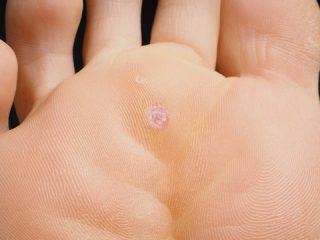Verrucas
What is a Verrucae?
 A verruca is also commonly called a plantar wart. It is an infectious viral infection caused by the Human Papilloma Virus (HPV), which enters your skin through a scratch or a cut in your foot.
A verruca is also commonly called a plantar wart. It is an infectious viral infection caused by the Human Papilloma Virus (HPV), which enters your skin through a scratch or a cut in your foot.
Once the virus has penetrated into a site on your foot there may be no immediate sign of infection. It could take months before a verruca appears. The Virus enters the top layer of your skin, called the epidermis and is pushed into the deeper layer of your skin called the dermis. This is due to pressure going through the sole of your foot when standing/walking. Therefore a verruca will affect the two layers of skin on the sole of your foot.
There are 2 types of Verrucae, you can have a single verruca or a mosaic vurruca. A mosaic verruca is a cluster of verrucae in the one site in your foot, therefore appearing quite big and unsightly.
What does it look like?
Both types of verruca have the same appearance, although the mosaic verrucae tends to be on a grander scale. If you are able to have a really good look at a verruca, you will be able to see the capillary heads pushed up from the dermis, into the epidermis layer of skin. They look like you have little bits of pepper corn under your skin.
The verruca creates thickened skin to grow over the affected site, which is why some people may think a verruca is a corn at first. The thickened skin can grow very hard and quite bumpy, like the top of a mini cauliflower head!
Also, look at your finger tips and you will see your finger prints. These lines are called striations. If you have a verruca the striations where your verruca will have disappeared. However when your verruca goes away the striation lines will come back again.
How did I get this?
Just like catching the cold from being around someone who has the virus, you can pick up the verruca virus by walking around barefoot, after someone who has a verruca. Popular places to come into contact with the verruca virus are around the swimming pool and public changing rooms. To limit contracting the virus, wear flip flops around the pools and changing rooms.
If you or someone else in your family has a verruca, never share a towel and do not walk barefoot around the house. Verrucaes are contagious!
How do I treat this?
The Podiatrist at the Dubai Podiatry Centre will assess your lesion to determine whether it is a corn or a verruca. If you are diagnosed with a verruca, the Podiatrist will use a treatment called Dermojet. It is the latest in verruca treatment.
For appointment, contact us:
Call: + 971 4 3435390
WhatsApp: + 971 50 355 3024
info@dubaipodiatry.com
To book online: Click here








8 comments
Georgina B.
September 18, 2017 at 4:13 pm
Thank you Michelle and Dubai Podiatry! verrucas are all gone! back to having beautiful feet again x
Ishaan
October 1, 2017 at 11:34 am
Had these for years and couldn’t thank you enough for treating it. Six weeks since I first had the treatment and it’s all gone now. All the best to you guys!
Mildred
October 1, 2017 at 11:36 am
Thank you to all Dubai Podiatry Centre for being so nice and patient with me through out the process (consultation and treatment). I’m excited for the results in few weeks.
Roselle
October 22, 2017 at 11:08 am
Hello Michelle, just want to say thank you for looking after my son’s foot. The verruca went black and fell of after weeks of having the dermojet treatment. I sent a whatsapp message with the photos. All the best!
Rujoe
May 6, 2018 at 12:01 pm
What is the Cpt code for Dermojet please?
Dubai Podiatry Centre
May 10, 2018 at 5:12 pm
Dear Rujoe, please can you elaborate on your question? Best wishes, DPC
Rujoe
May 21, 2018 at 11:39 am
Hi Thanks for reverting. I will have to claim for reimbrusement, as such my insurance is requesting for the CPT code for Dermojet to confirm on the coverage.
Also please advise the difference on dermojet and cryotherapy.
Many thanks
Dubai Podiatry Centre
May 23, 2018 at 2:27 pm
Dear Rujoe, You can send us a WhatsApp and we will request photos and write you a medical report for your case. Or you may need to come in and meet the Podiatrist Michelle Champlin for assessment. You can check with your insurance before coming if you are covered for a consultation with a Podiatrist. Best wishes, Dubai Podiatry Centre The WhatsApp is 0503553024 to send your information to us.